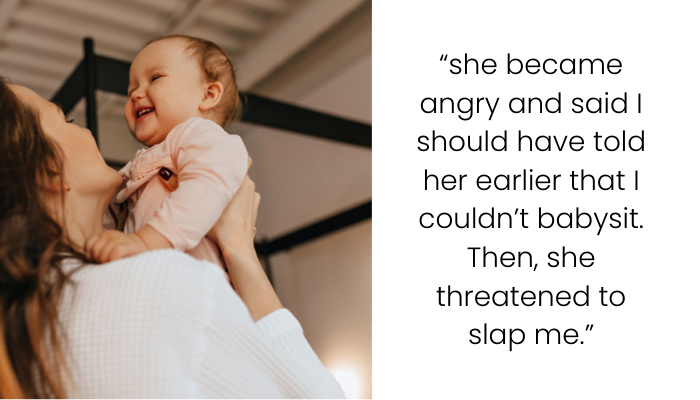Teen Refuses to Babysit Niece, Faces Family Backlash and Threats
A 13-year-old girl finds herself at the center of a familial dispute after declining to babysit her niece on a rare school-free day. Having made prior plans with her cousin, she politely refused her 25-year-old sister’s last-minute request for childcare assistance. The situation escalated when her sister responded with threats of physical violence, and their brother joined in, criticizing her decision while he himself was unavailable due to personal commitments. The teenager highlights a perceived double standard in her family, where her brother’s refusals are accepted without issue, but her own are met with hostility.
This incident sheds light on deeper issues within the family dynamics, including gender-based expectations and the emotional burden placed on young girls. The teenager’s experience raises questions about the fairness of assigning caregiving responsibilities based on age and gender, and the psychological impact of such expectations on adolescents.
You’re expected to go the extra mile for family, but this teen refused to give up her one night off to babysit her niece

When she told her sister she had plans to hang out with her cousin, her sister was infuriated and threatened to slap her







1. Gendered Expectations in Family Roles
The expectation for girls to assume caregiving roles within the family is a well-documented phenomenon. Studies indicate that girls are often socialized to take on domestic responsibilities, while boys are not held to the same standards. This disparity can lead to an unequal distribution of household labor and emotional strain on young girls. For instance, research has shown that girls are more likely to be assigned tasks like babysitting and cleaning, reinforcing traditional gender roles and limiting their personal time and development opportunities.
2. The Psychological Impact of Parentification
Assigning adult responsibilities to children, known as parentification, can have significant psychological effects. When children are expected to care for siblings or manage household duties, it can interfere with their normal development and lead to issues such as anxiety, depression, and a sense of isolation. This is particularly concerning when the caregiving role is imposed without the child’s consent or when it disrupts their social and academic life.
3. Emotional Abuse and Threats Within Families

The teenager’s account of being threatened by her sister raises concerns about emotional abuse within the family. Emotional abuse can manifest as threats, intimidation, and other behaviors aimed at controlling or belittling another person. Such abuse can have long-lasting effects on a person’s self-esteem and mental health. It’s important to recognize and address these behaviors to ensure a safe and supportive family environment.
4. Addressing Gender Bias in Household Responsibilities
To create a more equitable family dynamic, it’s essential to challenge and change gender-based expectations. Encouraging all family members, regardless of gender, to share in household duties can promote fairness and reduce the burden on any one individual. Open communication about responsibilities and respect for each person’s time and commitments are key steps in fostering a balanced and supportive home environment.
In the comments, readers swiftly agreed that the teen was not being a jerk and that her sister was just mad because she made the wrong assumption and it backfired on her







This case highlights the importance of recognizing and addressing gender biases and emotional abuse within family structures. By promoting equitable distribution of responsibilities and fostering respectful communication, families can create healthier environments that support the well-being and development of all members.

